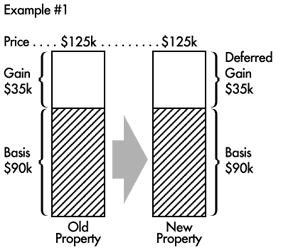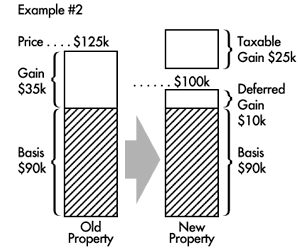You are here
1031 News › How Basis and Gain Work in a 1031 Exchange › How Basis and Gain Work in a 1031 ExchangeHow Basis and Gain Work in a 1031 Exchange
Error message
Deprecated function: The each() function is deprecated. This message will be suppressed on further calls in _taxonomy_menu_trails_menu_breadcrumb_alter() (line 436 of /home/expert1031/public_html/sites/all/modules/taxonomy_menu_trails/taxonomy_menu_trails.inc).
Probably the hardest concept for clients to grasp is why, if they get money back in a 1031 exchange, it's taxable. They don't understand why they have to pay tax on what they see as their own money–money that they've already paid tax on.
To explain this, let me use an actual client situation: Fred bought a foreclosure property from the bank last year for $90,000. Since it was a foreclosure, things were moving fast, so Fred used cash from his savings account to purchase the property.
Now, a year later, the tenant wants to buy the property; they agree on a price of $125,000, which we're holding in an exchange account for Fred. He's found several potential replacement properties, one of which is another foreclosure property, for $100,000. In discussing the purchase, I point out to him that he will have to buy a second property in order to equalize his exchange and avoid paying tax. Fred can't understand, if $90,000 of his previously taxed monies are tied up in the transaction, why he has to pay tax again on the $25,000 he gets back if he buys down.
I understand where Fred's coming from, and I sympathize with his frustration. However, Section 1031 requires that you buy equal or up, otherwise the buy-down is taxable. Since Fred sold for $125,000, if he buys a replacement property for less than that he'll pay tax on the amount of the buy-down. Doesn't seem fair, does it? He's already paid tax on the $90,000, so as long as he rolls over the gain of $35,000 he should be OK. So why will he have to pay tax again?
The logic behind the code section is that Fred's basis from the old property rolls over to the new. Once you understand this, the code section makes sense.
Let's start with an example where Fred buys a property equal to what he sold for. If this is the case, Fred's basis in the new property will be exactly the same as the basis in his old property, as shown here:
crej081810-example1-250.gif

As you can see in the example above, Fred's basis in the new property is the same as the basis in his old, and the rest of the price of the property is his deferred gain.
Now, let me show you what happens if Fred buys the $100,000 property he called me about and doesn't equalize his exchange. Notice that his basis still rolls over from the old property, but watch what happens to his gain:
crej081810-example2-250.gif

See how his basis in the new property is the same as his basis in the old property? This is how the IRS views Section 1031: to them, when you do an exchange, you first roll the basis from the old property over to the new. Notice that the excess of the purchase price, when you buy down, is split between the deferred gain and the taxable gain.
You and I think just the opposite of the IRS. To us it makes sense to start by rolling over the gain, and everything in excess of that would be treated as basis. But until you and I get to write the tax law, we're stuck with how the IRS views this stuff.





Add new comment